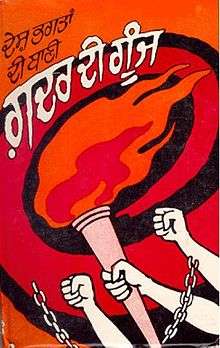Herambalal Gupta
Heramba Lal Gupta was an Indian Nationalist linked to the Berlin Committee and the Ghadar Party extensively involved in the Hindu–German Conspiracy, who later turned a British agent and passed in intelligence on Mahendra Pratap's Kabul Government.
At the outbreak of World War I, Gupta was in Germany as member of the Berlin Committee, which within a short time established contacts with the Ghadar Party in the United States in what came to be called the Hindu–German Conspiracy. Efforts had begun as early as 1911 to procure arms and smuggle them into India.[1] When a clear idea of the conspiracy emerged, more earnest and elaborate plans were made to obtain arms and to enlist international support. After the failure of the SS Korea mission, Herambalal Gupta took over the leadership of American wing of the conspiracy and began efforts to obtain men and arms. While the former resource was in plentiful supply with more and more Indians coming forward to join the Ghadarite cause, obtaining arms for the uprising proved to be more difficult.[2]
The revolutionaries started negotiations with the Chinese government through James Dietrich, who held Sun Yat-sen's power of attorney, to buy a million rifles. However, the deal fell through when it was realised that the weapons offered were obsolete flintlocks and muzzle loaders. From China, Gupta went to Japan to try to procure arms and to enlist Japanese support for the Indian independence movement. However, he was forced into hiding within 48 hours when he came to know that the Japanese had planned to hand him over to the British.[2] Later reports indicated he was protected at this time by Tōyama Mitsuru.[3]
The ascent of Li Yuanhong to the Chinese Presidency in 1916 led to the negotiations reopening through his former private secretary who resided in the United States at the time. In exchange for allowing arms shipments to India via China's borders, China was offered German military assistance and the rights to 10% of any material shipped to India via China. The negotiations were ultimately unsuccessful due to Sun Yat Sen's opposition to an alliance with Germany.[4]
Gupta is believed to have later met with Mahendra Pratap's Provisional Government of India in Kabul, but he defected in 1918 and turned over his intelligence to British Indian police.
Notes
- ↑ Plowman 2003, p. 87
- 1 2 Brown 1948, p. 301
- ↑ Popplewell 1995, p. 276
- ↑ Brown 1948, p. 307
References
- Celebrated Spies and Famous Mysteries of the Great War By George Barton.1919. Page company.
- Political Thinkers of Modern India. By Verinder Grover. 1992.Deep & Deep Publications.
- Indian Revolutionaries Abroad, 1905-1922. By Arun Bose . 1971. Bharati Bhawan
- Gupta, Amit K (1997), Defying Death: Nationalist Revolutionism in India, 1897-1938.Social Scientist, Vol. 25, No. 9/10. (Sep. - Oct., 1997), pp. 3-27, Social Scientist, ISSN 0970-0293.
- Strachan, Hew (2001), The First World War. Volume I: To Arms, Oxford University Press. USA, ISBN 0-19-926191-1.
- Popplewell, Richard J (1995), Intelligence and Imperial Defence: British Intelligence and the Defence of the Indian Empire 1904-1924., Routledge, ISBN 0-7146-4580-X.
- Dignan, Don (1983), The Indian revolutionary problem in British Diplomacy,1914-1919, New Delhi, Allied Publishers.
